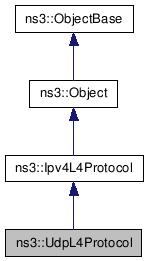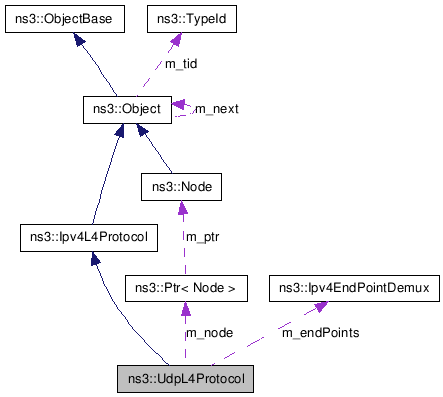ns3::UdpL4Protocol Class Reference
[Udp]
Implementation of the UDP protocol.
More...
#include <udp-l4-protocol.h>


Public Member Functions | |
| virtual int | GetProtocolNumber (void) const |
| Ptr< Socket > | CreateSocket (void) |
| void | Send (Ptr< Packet > packet, Ipv4Address saddr, Ipv4Address daddr, uint16_t sport, uint16_t dport) |
| Send a packet via UDP. | |
| virtual enum Ipv4L4Protocol::RxStatus | Receive (Ptr< Packet > p, Ipv4Address const &source, Ipv4Address const &destination, Ptr< Ipv4Interface > interface) |
| Receive a packet up the protocol stack. | |
| virtual void | ReceiveIcmp (Ipv4Address icmpSource, uint8_t icmpTtl, uint8_t icmpType, uint8_t icmpCode, uint32_t icmpInfo, Ipv4Address payloadSource, Ipv4Address payloadDestination, const uint8_t payload[8]) |
| Receive an ICMP packet. | |
Static Public Member Functions | |
| static TypeId | GetTypeId (void) |
| This method returns the TypeId associated to ns3::UdpL4Protocol. | |
Protected Member Functions | |
| virtual void | DoDispose (void) |
| virtual void | NotifyNewAggregate () |
Detailed Description
Implementation of the UDP protocol.Member Function Documentation
| virtual void ns3::UdpL4Protocol::DoDispose | ( | void | ) | [protected, virtual] |
This method is called by Object::Dispose or by the object's destructor, whichever comes first.
Subclasses are expected to implement their real destruction code in an overriden version of this method and chain up to their parent's implementation once they are done. i.e., for simplicity, the destructor of every subclass should be empty and its content should be moved to the associated DoDispose method.
Reimplemented from ns3::Object.
| virtual int ns3::UdpL4Protocol::GetProtocolNumber | ( | void | ) | const [virtual] |
| static TypeId ns3::UdpL4Protocol::GetTypeId | ( | void | ) | [static] |
This method returns the TypeId associated to ns3::UdpL4Protocol.
No Attributes defined for this type.
Attributes defined in parent class ns3::Ipv4L4Protocol:
-
ProtocolNumber: The Ipv4 protocol number.
- Set with class: ns3::UintegerValue
- Underlying type: int32_t 18446744071562067968:2147483647
- Flags: read
Reimplemented from ns3::Ipv4L4Protocol.
| virtual void ns3::UdpL4Protocol::NotifyNewAggregate | ( | ) | [protected, virtual] |
This function is called by the AggregateObject on all the objects connected in the listed chain. This way the new object aggregated will be used if needed by the NotifyNewAggregate corresponding to each object connected in the listed chain. It should be implemented by objects needing an additional/special behavior when aggregated to another object.
Reimplemented from ns3::Object.
| virtual enum Ipv4L4Protocol::RxStatus ns3::UdpL4Protocol::Receive | ( | Ptr< Packet > | p, | |
| Ipv4Address const & | source, | |||
| Ipv4Address const & | destination, | |||
| Ptr< Ipv4Interface > | interface | |||
| ) | [virtual] |
Receive a packet up the protocol stack.
- Parameters:
-
p The Packet to dump the contents into source The source's Ipv4Address destination The destinations Ipv4Address interface the interface from which the packet is coming.
Implements ns3::Ipv4L4Protocol.
| virtual void ns3::UdpL4Protocol::ReceiveIcmp | ( | Ipv4Address | icmpSource, | |
| uint8_t | icmpTtl, | |||
| uint8_t | icmpType, | |||
| uint8_t | icmpCode, | |||
| uint32_t | icmpInfo, | |||
| Ipv4Address | payloadSource, | |||
| Ipv4Address | payloadDestination, | |||
| const uint8_t | payload[8] | |||
| ) | [virtual] |
Receive an ICMP packet.
- Parameters:
-
icmpSource The IP address of the source of the packet. icmpTtl The time to live from the IP header icmpType The type of the message from the ICMP header icmpCode The message code from the ICMP header icmpInfo 32-bit integer carrying informational value of varying semantics. payloadSource The IP source addresss from the IP header of the packet payloadDestination The IP destination address from the IP header of the packet payload Payload of the ICMP packet
Reimplemented from ns3::Ipv4L4Protocol.
| void ns3::UdpL4Protocol::Send | ( | Ptr< Packet > | packet, | |
| Ipv4Address | saddr, | |||
| Ipv4Address | daddr, | |||
| uint16_t | sport, | |||
| uint16_t | dport | |||
| ) |
Send a packet via UDP.
- Parameters:
-
packet The packet to send saddr The source Ipv4Address daddr The destination Ipv4Address sport The source port number dport The destination port number
The documentation for this class was generated from the following files:
- src/internet-stack/udp-l4-protocol.h
- doc/introspected-doxygen.h
 1.5.8
1.5.8